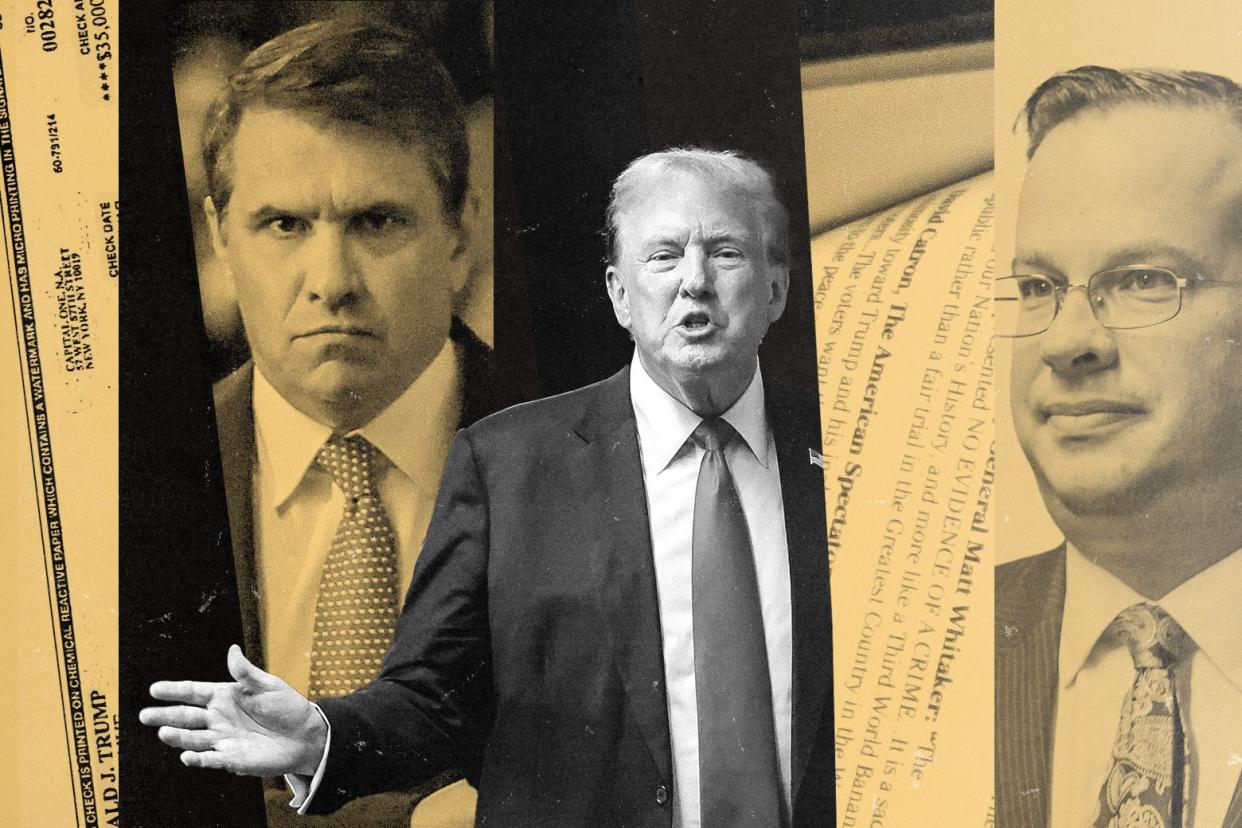On Trump Trial Closing Arguments Day, You Could Feel the Gravity in the Room

- Oops!Something went wrong.Please try again later.
Read our ongoing coverage of Donald Trump’s first criminal trial here.
As the jury heard closing arguments in Donald Trump’s hush money trial over the span of 10 grueling hours on Tuesday, the gravity around what was about to take place was palpable. Both the prosecution and the defense wanted to make a lasting impression on the jury and remind them that they are tasked with deciding the fate of a former U.S. president.
Trump came to court with a show of force; almost all of his adult children, Don Jr., Eric, and Tiffany, plus his daughter-in-law Lara—the Republican National Committee’s newest co-chair—were in attendance, sitting right behind their family’s patriarch. Meanwhile, Manhattan District Attorney Alvin Bragg sat on the prosecution’s side flanked by a security detail.
The jury was remarkably alert throughout the marathon day in court, sitting up straight and watching intently as both sides presented their arguments. Even through the more dramatic moments of the day, they remained poker-faced.
Todd Blanche, Trump’s lead attorney, spent about three hours shredding Michael Cohen’s credibility as Trump’s former fixer and personal attorney, and painting the former president as focused on running the country and uninterested in dealing with day-to-day company administrative business. “President Trump is innocent. He did not commit any crimes and the DA has not met his burden of proof. Period,” Blanche said.
Over and over again, Blanche accused Cohen of flatly lying to the jury while on the witness stand, and toward the end of his closing argument Blanche got so animated with degrading Cohen that he told the jury, “You cannot send someone to prison—you cannot convict somebody based upon on the words of Michael Cohen.”
The prosecution immediately objected to that line, and later, a visibly angry Justice Juan Merchan told Blanche his prison comment was “outrageous” and that he could not imagine that it was merely an accident.
The confrontation simply reflected just how high the stakes were on Tuesday—with the help of visual aids, both the defense and prosecution walked back through the evidence to make the jury understand why their interpretation of what happened with Trump’s business records was the correct one. Watching Blanche’s closing argument, it became clear there was a word-association strategy at play: say the words “liar” and “Cohen” in close proximity as many times as humanly possible.
“They want to make this case about Michael Cohen,” proclaimed Joshua Steinglass, Manhattan’s assistant district attorney since 1998 and the one in charge of delivering the prosecution’s closing argument. “It isn’t. That’s a deflection.”
Steinglass spent about five hours meticulously rebuking Todd Blanche, looking all 12 members of the jury in the eye in an attempt to convince them that they should convict Trump of all 34 counts of falsifying business records in the first degree. He went through every major point of the six-week trial, but there was one common thread throughout his closing argument: Aside from how one might feel about his trustworthiness and him as a person, Michael Cohen is telling the truth in this case. Steinglass openly admitted that Cohen, as Trump’s former personal fixer and attorney, is an imperfect witness—he’s a convicted felon and has admitted to lying to Congress. But the prosecution doesn’t get to pick its witnesses, and Cohen knows where the bodies are buried, whether we like it or not. Cohen’s relationship with Trump quickly deteriorated once he was elected to the White House and Cohen became “the fall guy” for Trump’s misdeeds.
Steinglass also reminded the jury that this case isn’t about Cohen, but about recordkeeping fraud. And, he argued, Trump was acutely aware of the scheme to pay Cohen back for handling the $130,000 hush money payment to adult film actor Stormy Daniels, with invoices, checks, and vouchers incriminating the former president. Steinglass also pointed to at least five separate quotes from Trump’s various published books that suggest he was indeed intimately involved in his business’ finances and would never sign something without knowing all the underlying details. “Always look at the numbers yourself. If things turn grim, you’re the one left holding the checkbook,” wrote Trump in Think Like a Billionaire.
Justice Merchan delivered instructions to the jury on Wednesday morning, and now they finally get to leave the stuffy Manhattan courtroom and decide Trump’s fate. All the rest of us can do is wait.

